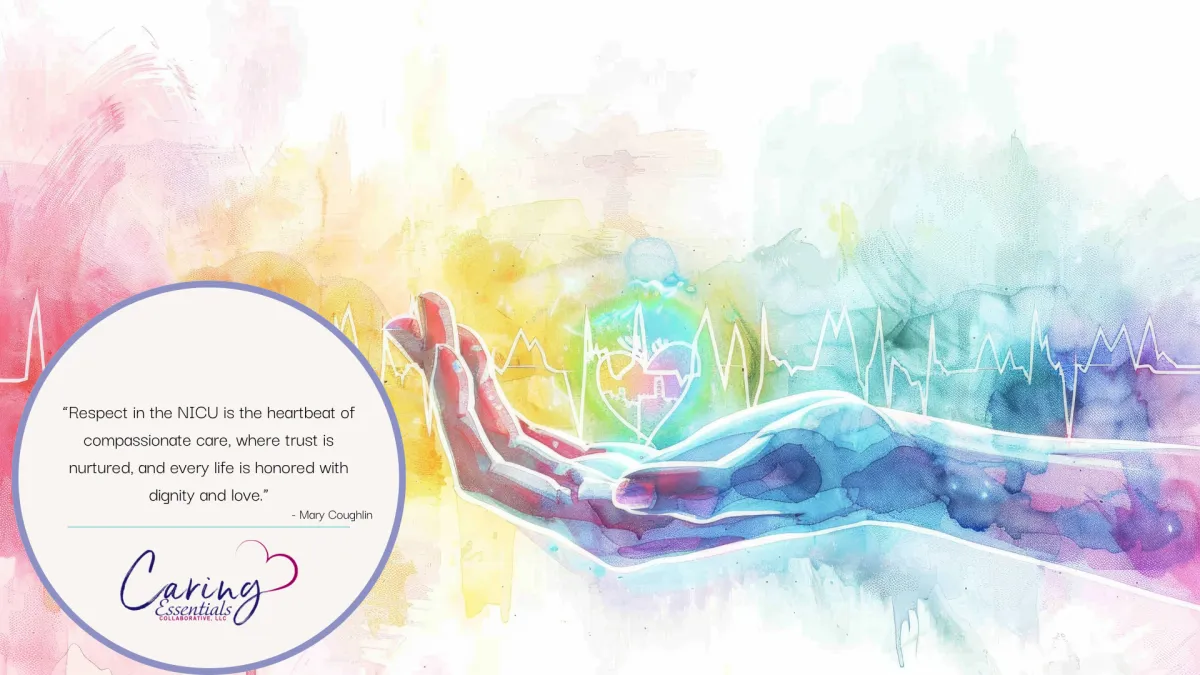
The Vital Role of Respect in the NICU: Building a Foundation of Trust and Compassion
"Respect in the NICU is the heartbeat of compassionate care, where trust is nurtured, and every life is honored with dignity and love." - Mary Coughlin
Today I want to talk about the final element of the B.U.F.F.E.R. approach—respect. In the Neonatal Intensive Care Unit (NICU), respect is the cornerstone that supports a culture of trust, compassion, and effective care for babies, families, and clinicians.
Respect for Babies
Respecting our tiniest patients means recognizing their personhood and treating them with dignity. Every baby in the NICU is a unique individual with their own needs and responses. Respecting babies involves acknowledging their most quintessential needs as a fellow human being; recognizing the biologic relevance for physical and emotional proximity of their parent(s); attuning and responding to their pre-verbal expressions of communication; anticipating their distress and ensuring that their pain and distress is consistently and effectively managed in ways that honor their humanity. This respectful approach promotes better outcomes both physically and emotionally. Respect in the NICU ensures that every interaction with a baby is conducted with kindness and compassion, acknowledging their inherent worth.
Respect for Families
Families in the NICU are experiencing one of the most challenging times in their lives. Respecting families means actively listening to their concerns, empowering and involving them in care decisions, and requesting and valuing their input. It’s about understanding their journey, providing support, and treating them as the integral members of the care team they are. When we show respect to families, we build trust and create a collaborative environment where they are empowered and supported. This respectful partnership enhances the family’s ability to care for their baby, validating their role identity, and fostering positive parenting experience during an incredibly stressful time.
Respect Among Clinicians
Respect within the care team is fundamental to creating a positive and effective work environment. When clinicians respect each other’s expertise, perspectives, and contributions, it fosters a culture of collaboration and mutual support. Respectful communication and interactions among the team ensure that everyone feels valued and heard. This not only improves team dynamics but also directly impacts the quality of care provided to the babies and families. Respect among clinicians reduces conflict, enhances job satisfaction, and promotes a more cohesive and efficient care environment.
How Respect Transforms Care
The impact of respect in the NICU is profound and far-reaching. Here’s how it enhances practice:
1. Building Trust: Respect is the foundation of trust. When babies, families, and clinicians feel respected, it builds a strong sense of trust that is essential for effective care and collaboration.
2. Enhancing Communication: Respectful communication ensures that everyone’s voice is heard and valued. This leads to better understanding, fewer misunderstandings, and more effective care planning and delivery.
3. Fostering Compassion: Respecting each other’s experiences and perspectives fosters a culture of compassion. This compassionate approach enhances the emotional well-being of babies, families, and clinicians.
4. Promoting Inclusion: Respecting diversity and individual differences promotes an inclusive environment where everyone feels welcome and valued. This inclusion enhances the care experience for all involved.
5. Encouraging Growth: A respectful environment encourages continuous learning and professional growth. Clinicians feel supported in their development, leading to better care practices and even innovation.
The Ripple Effect of Respect
When respect is at the heart of our NICU practice, the benefits extend beyond the immediate care environment. Babies receive care that honors their dignity and individuality, promoting their overall well-being. Families feel respected and valued, leading to stronger engagement and better health outcomes. Clinicians work in an environment that fosters respect and collaboration, enhancing their ability to provide compassionate, high-quality care.
Let’s commit to making respect a fundamental part of our daily practice in the NICU. By doing so, we can create a care environment where every baby, family, and clinician feels valued, supported, and respected.
With deep appreciation and love,
Mary Coughlin
